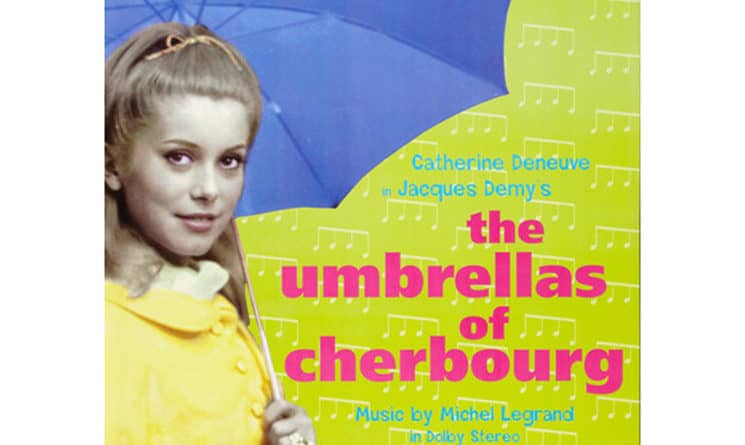“The Umbrellas of Cherbourg”
20th Century-Fox, 1964
Starring: Catherine Deneuve, Nino Castelnuovo, Ellen Farner, Marc Michel
Director: Jacques Demy
The plot: It is the late 1950s. Madame Emery and her 16-year-old daughter Genevieve (Deneuve) run a small, not-very-successful umbrella boutique in Cherbourg on the Normandy coast. A handsome auto mechanic, Guy (Castelnuovo), cares for his sickly godmother. Genevieve and Guy are madly in love and plan to marry. Madeleine (Farner) is a caregiver for Guy’s godmother and has unexpressed feelings for Guy. When Guy is drafted into the Algerian War and must leave, he and Genevieve pledge their undying love. Soon Genevieve discovers she is pregnant by Guy, but has a new suitor, the wealthy Roland (Michel). Madame Emery and Madeleine convince Genevieve she should give up on Guy and marry Roland. The ensuing events of the four characters’ lives span the next five years.
Why it’s good: This film is undeniably one of the most unique ever made — it is not a musical in the usual sense, but every single line of dialogue is sung as recitative, even the most casual statements, exactly like opera. The marvelous score is by the celebrated Michel Legrand, who set director Demy’s “libretto” to music. What easily could have been a mawkish, saccharine soap opera is instead the zenith of charm. Demy’s conception of a modern-day fairy tale (based loosely on plays by Marcel Pagnol) told completely in song was thoroughly realized through winsome acting, the unforgettable score, sets that look like they’re straight out of a Disney cartoon, and, above all, an astounding use of color. All the sets, props, and costumes are in vivid primaries, bold pastels, and blends and variations of every hue on the spectrum. The film looks as if it’s made of candy and is saturated with supercolor; Demy was prescient enough to shoot color separation masters on black and white Eastman negative stock that cannot fade. To call a film “magical” sounds trite at best and hackneyed at worst, but the description truly fits this — I’ll say it — enchanting film.
The legacy: Jay Goldsmith, my Portsmouth High School English teacher in the 1970s, chose this gem as a subject of study for our film appreciation class. The movie knocked me over on that first viewing, and even more so on my second screening 25 years later. This extraordinary movie launched Deneuve’s long and impressive career, which continues to this day. Legrand would go on to a stellar career as a jazz pianist and composer, winning several Academy Awards. Demy’s later films (all made in France) never inspired the excitement of “Umbrellas” (it won the Palme d’Or at Cannes and garnered five Oscar nominations and critical and box office success), but he enjoyed an active career until his early death in 1990. Lyricist Sheldon Harnick mounted an English-language stage adaptation in 1979. The Criterion Collection offers the 2004 restoration with a slew of special features as well as an anthology, “The Essential Jacques Demy.”

